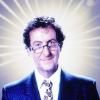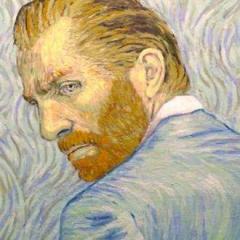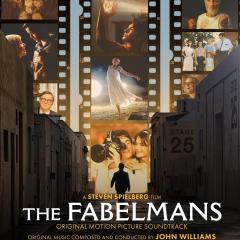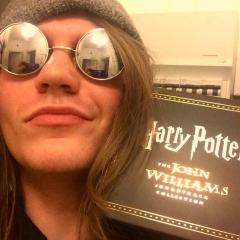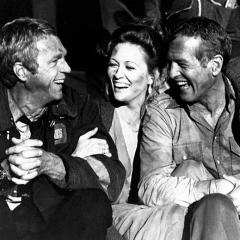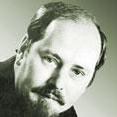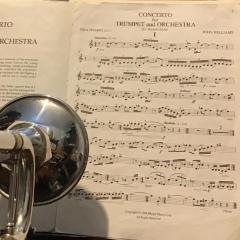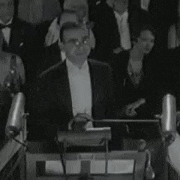
Jediwashington
-
Posts
150 -
Joined
-
Last visited
-
Days Won
2
Reputation Activity
-
 Jediwashington got a reaction from Dr. Know in I can't believe it's not John Williams! (the best imitators)
Jediwashington got a reaction from Dr. Know in I can't believe it's not John Williams! (the best imitators)
Randol Bass definitely gets on this list. He has some corny stuff for educational ensembles, but his Gloria written in 1990 actually predates Call of the Champions by quite a bit despite sounding really similar. Can't find a good recording of his night before christmas, but it has elements of that childlike orchestration from ET, BFG, and Home Alone etc.
-
 Jediwashington got a reaction from artguy360 in I can't believe it's not John Williams! (the best imitators)
Jediwashington got a reaction from artguy360 in I can't believe it's not John Williams! (the best imitators)
Randol Bass definitely gets on this list. He has some corny stuff for educational ensembles, but his Gloria written in 1990 actually predates Call of the Champions by quite a bit despite sounding really similar. Can't find a good recording of his night before christmas, but it has elements of that childlike orchestration from ET, BFG, and Home Alone etc.
-
 Jediwashington got a reaction from Will in Masked Dissonance in The Music of John Williams
Jediwashington got a reaction from Will in Masked Dissonance in The Music of John Williams
Yes - 100% this. He simply writes for orchestra like big bands. The chord complexity you can certainly analyze from a romantic theory standpoint, but it is much stronger of an argument to simply call him a jazz pianist and composer. That being said, I would put him near the top in jazz pianists/theorists, but for a jazz pianist you are mostly using chords to drive interest/complexity/mood/color/shape and less concerned about the individual notes. He's collected hundreds of progressions and modulations over his years that communicate certain moods/emotions and he just uses them at will like a language when writing. One of the other things you will notice about jazz is that they tend to set up a type of dissonance like it's a standard part of that key "world" so to speak. They will then selectively increase or decrease dissonance for effect. You see applied everywhere in E.T. where he essentially writes the whole thing in lydian and keeps the raised 4th and 7th the whole score writing 7th or 9th chords constantly, but pulls back into straight triads in minor keys for the antagonist theme (to great effect!) and increases dissonance and stacked chords to their breaking point leading into big moments. This constant slight dissonance of 7ths/9th allows him to go in two directions and subtlety move to a different mood quickly with lots of options where other composers may struggle to get there as tastefully. It's probably why he likes the ambiguity of open 5ths in melodies so much.
He's intelligent enough to go back and analyze it and write all this out in a book, but I wouldn't be surprised if that was actually a very difficult exercise for him to do since romantic harmony is not likely to be where his mind is when writing.
Now, the core question is if he uses orchestration selectively to increase/decrease dissonance. I would say he's gotten better at this as his career progressed and he finesses this a lot more after the Boston Pops years. He speaks of those years as being highly educational from an orchestration stand point. After mastering harmony, melody, and tone centers to create emotions, this has certainly been an area where I see a lot more sophistication the more he writes - especially with his doubling's. I can also usually tell when he's passed something off to be orchestrated by someone else. We can't neglect his ears and taste for balance during recording sessions as well. Recordings done by different conductors or even his own scores recorded by someone else can sound like completely different pieces with less important notes popping out of the texture.
-
 Jediwashington got a reaction from Once in Did Williams compose this piece from Fiddler On The Roof?
Jediwashington got a reaction from Once in Did Williams compose this piece from Fiddler On The Roof?
I mean, it's sort of a battle of semantics. In my opinion, Williams' Fiddler is not simply a re-orchestration and putting in a few transitions; it even presses the boundaries of arrangement into "reinterpretation" at times. That being said, all of the source material is from the original score with all melodies and vocal lines preserved 99% of the time. It's really the supporting material in the background that is the most different and adds a lot more virtuosity and he changes some keys. A simple crescendo in the broadway book gets incredible treatment from woodwind runs and miracle of miracles turns into this incredibly sweeping piece that puts the broadway version to shame from an orchestration standpoint. Everything from the original score is just brought to a different level of life with his additions, but Williams is tasteful and rarely alters the work structurally. Dances may be the exception to this, but the original book had TONS of dance music that isn't on albums that he may had pulled from. Been a while since I've played the show.
The violin melody is from the original show, but he takes a lot more liberty with the development. As karelm mentioned, the entre'acte also has a lot of material that isn't necessarily composed, but has really imaginative combinations as well.
The show has so many great classic melodies and motifs, you don't really need to "compose" much.
-
 Jediwashington got a reaction from MikeH in JW interview by the Philadelphia Orchestra
Jediwashington got a reaction from MikeH in JW interview by the Philadelphia Orchestra
I disagree. While there is certainly some gushing in there, there were some subtle variations to his standard set of questions that gave us some more insight; for instance I don't think Williams really answered the question well when he asked about what he listens to when he is trying to capture a different culture. He alluded to needing professional modern chromatic flutes to make a sound like Asian flutes - which I suspect is just be a bad cut, but when pressed a little he did mention that he needed to listen to more when working on Geisha for instance. He also asked about his composition process, but he knocked him off the normal script of "I don't read scripts/pencil paper" and he talked a little more about the melody refinement specifically in ET, which I hadn't heard him talk much about.
If anything, I think this is a badly cut/edited interview. He talks most openly and honestly to other musicians, composers, and conductors. His media interviews are always dull and repetitive. When someone can knock him off script, that's when we get great insights, but he has clearly been well trained by the marketing folks during his time with the Boston Pops to not get too technical or in the weeds for fear of losing people and he seems very aware of that in interviews. His own agent might be coaching that as well, but he's at an age that I really wish they would just let him talk or sit him down with some conductors/musicians and just record conversations for prosperity. He's way too humble to agree to that though!
-
 Jediwashington got a reaction from Joni Wiljami in JW interview by the Philadelphia Orchestra
Jediwashington got a reaction from Joni Wiljami in JW interview by the Philadelphia Orchestra
I disagree. While there is certainly some gushing in there, there were some subtle variations to his standard set of questions that gave us some more insight; for instance I don't think Williams really answered the question well when he asked about what he listens to when he is trying to capture a different culture. He alluded to needing professional modern chromatic flutes to make a sound like Asian flutes - which I suspect is just be a bad cut, but when pressed a little he did mention that he needed to listen to more when working on Geisha for instance. He also asked about his composition process, but he knocked him off the normal script of "I don't read scripts/pencil paper" and he talked a little more about the melody refinement specifically in ET, which I hadn't heard him talk much about.
If anything, I think this is a badly cut/edited interview. He talks most openly and honestly to other musicians, composers, and conductors. His media interviews are always dull and repetitive. When someone can knock him off script, that's when we get great insights, but he has clearly been well trained by the marketing folks during his time with the Boston Pops to not get too technical or in the weeds for fear of losing people and he seems very aware of that in interviews. His own agent might be coaching that as well, but he's at an age that I really wish they would just let him talk or sit him down with some conductors/musicians and just record conversations for prosperity. He's way too humble to agree to that though!
-
 Jediwashington got a reaction from Will in R.I.P. Kobe Bryant, for whom JW wrote Dear Basketball
Jediwashington got a reaction from Will in R.I.P. Kobe Bryant, for whom JW wrote Dear Basketball
How sad... I wonder if Williams will write something or perform dear basketball for the community. I imagine he is distraught as well. They seemed close.
-
 Jediwashington reacted to Holko in If you got to sit down and talk with JW, what would your top three questions be?
Jediwashington reacted to Holko in If you got to sit down and talk with JW, what would your top three questions be?
Exactly how much of Chamber of Secrets did you write
-
 Jediwashington reacted to Tom in The Book Thief vs. The BFG vs. The Post - The "middling" JW scores from the last few years!
Jediwashington reacted to Tom in The Book Thief vs. The BFG vs. The Post - The "middling" JW scores from the last few years!
All three scores are very good. All of them are adversely affected by the weakness of the movies in which they appear. BFG, and its associated suite, is my favorite and has moments are true brilliance--though, like the movie itself, you have to be in a childlike mood to appreciate it.
-
 Jediwashington got a reaction from Loert in Masked Dissonance in The Music of John Williams
Jediwashington got a reaction from Loert in Masked Dissonance in The Music of John Williams
Yes - 100% this. He simply writes for orchestra like big bands. The chord complexity you can certainly analyze from a romantic theory standpoint, but it is much stronger of an argument to simply call him a jazz pianist and composer. That being said, I would put him near the top in jazz pianists/theorists, but for a jazz pianist you are mostly using chords to drive interest/complexity/mood/color/shape and less concerned about the individual notes. He's collected hundreds of progressions and modulations over his years that communicate certain moods/emotions and he just uses them at will like a language when writing. One of the other things you will notice about jazz is that they tend to set up a type of dissonance like it's a standard part of that key "world" so to speak. They will then selectively increase or decrease dissonance for effect. You see applied everywhere in E.T. where he essentially writes the whole thing in lydian and keeps the raised 4th and 7th the whole score writing 7th or 9th chords constantly, but pulls back into straight triads in minor keys for the antagonist theme (to great effect!) and increases dissonance and stacked chords to their breaking point leading into big moments. This constant slight dissonance of 7ths/9th allows him to go in two directions and subtlety move to a different mood quickly with lots of options where other composers may struggle to get there as tastefully. It's probably why he likes the ambiguity of open 5ths in melodies so much.
He's intelligent enough to go back and analyze it and write all this out in a book, but I wouldn't be surprised if that was actually a very difficult exercise for him to do since romantic harmony is not likely to be where his mind is when writing.
Now, the core question is if he uses orchestration selectively to increase/decrease dissonance. I would say he's gotten better at this as his career progressed and he finesses this a lot more after the Boston Pops years. He speaks of those years as being highly educational from an orchestration stand point. After mastering harmony, melody, and tone centers to create emotions, this has certainly been an area where I see a lot more sophistication the more he writes - especially with his doubling's. I can also usually tell when he's passed something off to be orchestrated by someone else. We can't neglect his ears and taste for balance during recording sessions as well. Recordings done by different conductors or even his own scores recorded by someone else can sound like completely different pieces with less important notes popping out of the texture.
-
 Jediwashington reacted to The Five Tones in Masked Dissonance in The Music of John Williams
Jediwashington reacted to The Five Tones in Masked Dissonance in The Music of John Williams
Really interesting thread. Dissonance is rarely defined very well - in a precise, technical way - by any commentator. I don't personally find basic intervals like diatonic seconds dissonant, or even the kinds of bitonal polychords JW often writes, though they are often heard/spoken of that way. There are probably dozens of definitions to consider, including ones that take pitch/frequency perception into account. Also, accidental dissonance as a result of voicings, mixing, etc. or horizontal dissonance as opposite to just vertical. A historical view on dissonance, i.e. very few examples and almost no bodies of work before 1910 (except say Charles Ives) are dissonant in terms of harmonic language, as opposed to textbook dissonance a la species counterpoint. Certainly JW could be said to hit the mark on many different potential definitions of dissonance, as a passing effect of generally short duration.
Also, JW is an incredible harmonist; however, I often wish his harmonic language as expressed in his film cues was not so full of tonic major endings/climaxes as they are often inappropriate to the mood or direction of the harmony or at least restrict the potential effect of all the complexity that precedes them. I don't know; I've been listening to him since the mid-70s and maybe I haven't taken the time to think about this point another way. But he seems to treat these cadences as generally off limits for dissonance.
-
 Jediwashington got a reaction from ricsim88 in Masked Dissonance in The Music of John Williams
Jediwashington got a reaction from ricsim88 in Masked Dissonance in The Music of John Williams
Yes - 100% this. He simply writes for orchestra like big bands. The chord complexity you can certainly analyze from a romantic theory standpoint, but it is much stronger of an argument to simply call him a jazz pianist and composer. That being said, I would put him near the top in jazz pianists/theorists, but for a jazz pianist you are mostly using chords to drive interest/complexity/mood/color/shape and less concerned about the individual notes. He's collected hundreds of progressions and modulations over his years that communicate certain moods/emotions and he just uses them at will like a language when writing. One of the other things you will notice about jazz is that they tend to set up a type of dissonance like it's a standard part of that key "world" so to speak. They will then selectively increase or decrease dissonance for effect. You see applied everywhere in E.T. where he essentially writes the whole thing in lydian and keeps the raised 4th and 7th the whole score writing 7th or 9th chords constantly, but pulls back into straight triads in minor keys for the antagonist theme (to great effect!) and increases dissonance and stacked chords to their breaking point leading into big moments. This constant slight dissonance of 7ths/9th allows him to go in two directions and subtlety move to a different mood quickly with lots of options where other composers may struggle to get there as tastefully. It's probably why he likes the ambiguity of open 5ths in melodies so much.
He's intelligent enough to go back and analyze it and write all this out in a book, but I wouldn't be surprised if that was actually a very difficult exercise for him to do since romantic harmony is not likely to be where his mind is when writing.
Now, the core question is if he uses orchestration selectively to increase/decrease dissonance. I would say he's gotten better at this as his career progressed and he finesses this a lot more after the Boston Pops years. He speaks of those years as being highly educational from an orchestration stand point. After mastering harmony, melody, and tone centers to create emotions, this has certainly been an area where I see a lot more sophistication the more he writes - especially with his doubling's. I can also usually tell when he's passed something off to be orchestrated by someone else. We can't neglect his ears and taste for balance during recording sessions as well. Recordings done by different conductors or even his own scores recorded by someone else can sound like completely different pieces with less important notes popping out of the texture.
-
 Jediwashington got a reaction from SteveMc in Masked Dissonance in The Music of John Williams
Jediwashington got a reaction from SteveMc in Masked Dissonance in The Music of John Williams
Yes - 100% this. He simply writes for orchestra like big bands. The chord complexity you can certainly analyze from a romantic theory standpoint, but it is much stronger of an argument to simply call him a jazz pianist and composer. That being said, I would put him near the top in jazz pianists/theorists, but for a jazz pianist you are mostly using chords to drive interest/complexity/mood/color/shape and less concerned about the individual notes. He's collected hundreds of progressions and modulations over his years that communicate certain moods/emotions and he just uses them at will like a language when writing. One of the other things you will notice about jazz is that they tend to set up a type of dissonance like it's a standard part of that key "world" so to speak. They will then selectively increase or decrease dissonance for effect. You see applied everywhere in E.T. where he essentially writes the whole thing in lydian and keeps the raised 4th and 7th the whole score writing 7th or 9th chords constantly, but pulls back into straight triads in minor keys for the antagonist theme (to great effect!) and increases dissonance and stacked chords to their breaking point leading into big moments. This constant slight dissonance of 7ths/9th allows him to go in two directions and subtlety move to a different mood quickly with lots of options where other composers may struggle to get there as tastefully. It's probably why he likes the ambiguity of open 5ths in melodies so much.
He's intelligent enough to go back and analyze it and write all this out in a book, but I wouldn't be surprised if that was actually a very difficult exercise for him to do since romantic harmony is not likely to be where his mind is when writing.
Now, the core question is if he uses orchestration selectively to increase/decrease dissonance. I would say he's gotten better at this as his career progressed and he finesses this a lot more after the Boston Pops years. He speaks of those years as being highly educational from an orchestration stand point. After mastering harmony, melody, and tone centers to create emotions, this has certainly been an area where I see a lot more sophistication the more he writes - especially with his doubling's. I can also usually tell when he's passed something off to be orchestrated by someone else. We can't neglect his ears and taste for balance during recording sessions as well. Recordings done by different conductors or even his own scores recorded by someone else can sound like completely different pieces with less important notes popping out of the texture.
-
 Jediwashington got a reaction from Fabulin in Masked Dissonance in The Music of John Williams
Jediwashington got a reaction from Fabulin in Masked Dissonance in The Music of John Williams
Yes - 100% this. He simply writes for orchestra like big bands. The chord complexity you can certainly analyze from a romantic theory standpoint, but it is much stronger of an argument to simply call him a jazz pianist and composer. That being said, I would put him near the top in jazz pianists/theorists, but for a jazz pianist you are mostly using chords to drive interest/complexity/mood/color/shape and less concerned about the individual notes. He's collected hundreds of progressions and modulations over his years that communicate certain moods/emotions and he just uses them at will like a language when writing. One of the other things you will notice about jazz is that they tend to set up a type of dissonance like it's a standard part of that key "world" so to speak. They will then selectively increase or decrease dissonance for effect. You see applied everywhere in E.T. where he essentially writes the whole thing in lydian and keeps the raised 4th and 7th the whole score writing 7th or 9th chords constantly, but pulls back into straight triads in minor keys for the antagonist theme (to great effect!) and increases dissonance and stacked chords to their breaking point leading into big moments. This constant slight dissonance of 7ths/9th allows him to go in two directions and subtlety move to a different mood quickly with lots of options where other composers may struggle to get there as tastefully. It's probably why he likes the ambiguity of open 5ths in melodies so much.
He's intelligent enough to go back and analyze it and write all this out in a book, but I wouldn't be surprised if that was actually a very difficult exercise for him to do since romantic harmony is not likely to be where his mind is when writing.
Now, the core question is if he uses orchestration selectively to increase/decrease dissonance. I would say he's gotten better at this as his career progressed and he finesses this a lot more after the Boston Pops years. He speaks of those years as being highly educational from an orchestration stand point. After mastering harmony, melody, and tone centers to create emotions, this has certainly been an area where I see a lot more sophistication the more he writes - especially with his doubling's. I can also usually tell when he's passed something off to be orchestrated by someone else. We can't neglect his ears and taste for balance during recording sessions as well. Recordings done by different conductors or even his own scores recorded by someone else can sound like completely different pieces with less important notes popping out of the texture.
-
 Jediwashington reacted to #SnowyVernalSpringsEternal in Masked Dissonance in The Music of John Williams
Jediwashington reacted to #SnowyVernalSpringsEternal in Masked Dissonance in The Music of John Williams
Is it laziness or lack of skill?
-
 Jediwashington reacted to ricsim88 in Masked Dissonance in The Music of John Williams
Jediwashington reacted to ricsim88 in Masked Dissonance in The Music of John Williams
I guess that’s where his jazz background comes into play.
-
 Jediwashington reacted to crumbs in The Rise of Skywalker score has potentially begun recording
Jediwashington reacted to crumbs in The Rise of Skywalker score has potentially begun recording
He was writing kickass music at 83, then again at 85, then again at 86, so I'm not concerned. It will be sufficiently kickass. And when you consider the musical palette of IX will sufficiently ramp up the dramatic/emotional tone of the action scoring, it's a very enticing prospect indeed.
Williams always saves the most goosebump-inducing cues for the third score in his trilogies.
-
 Jediwashington reacted to karelm in The Rise of Skywalker score has potentially begun recording
Jediwashington reacted to karelm in The Rise of Skywalker score has potentially begun recording
5 oscars, 51 oscar nominations, Star Wars I-VII, Harry Potter, Jaws, Raiders, E.T., Superman, CEOTK weren't enough to convince you until TLJ and Galaxies Edge?
-
 Jediwashington reacted to Naïve Old Fart in The Rise of Skywalker score has potentially begun recording
Jediwashington reacted to Naïve Old Fart in The Rise of Skywalker score has potentially begun recording
So...its Schroedinger's recording?
-
 Jediwashington reacted to BrotherSound in The Rise of Skywalker score has potentially begun recording
Jediwashington reacted to BrotherSound in The Rise of Skywalker score has potentially begun recording
MOTR and a bass part. From top to bottom, most likely: bassoon, horns (3 staves), trumpets, trombones.
-

-
 Jediwashington reacted to Ludwig in New article: Williams "has so far written about 25 minutes of score in about a month" for The Rise of Skywalker
Jediwashington reacted to Ludwig in New article: Williams "has so far written about 25 minutes of score in about a month" for The Rise of Skywalker
So Williams now goes for walks outdoors to solve compositional problems? That's exactly how Beethoven used to work. And Williams is reading the Beethoven symphonies for pleasure. Hmm... Clearly, he's channeling his inner Beethoven for TROS!
(Btw, would absolutely love to hear a concert orchestral work from Williams whose musical architecture is influenced by Beethoven. Maybe something akin to a Shostakovich symphony. Williams loves 20th-century Russian music anyway!)
-

-
 Jediwashington got a reaction from _deleted_ in GALAXY'S EDGE - New John Williams composition (2018)
Jediwashington got a reaction from _deleted_ in GALAXY'S EDGE - New John Williams composition (2018)
That's probably the case. It's also probably why the ensemble isn't as clean as I expect from Williams. He's a notorious stickler about clean intonation and rhythms from the ensemble and I'm not hearing as much discipline from the orchestra as he would get from them - particularly on rhythm.
Yeah, Sony is just too small of a room for Star Wars in my opinion. It's such a loud score, it needs room to breath and a longer reverb time give the brass/perc some room to bloom. They keep Sony live by not putting up all the section isolation that you'll see in a lot of Giacchino's sessions, but it's still not big enough for the percussion and brass. I would have rather they recorded TFA and TLJ in a hall, like some of the Spielberg albums and the BSO albums. While still not ideal, those had more of that character than Sony does.
-
 Jediwashington got a reaction from crumbs in GALAXY'S EDGE - New John Williams composition (2018)
Jediwashington got a reaction from crumbs in GALAXY'S EDGE - New John Williams composition (2018)
That's probably the case. It's also probably why the ensemble isn't as clean as I expect from Williams. He's a notorious stickler about clean intonation and rhythms from the ensemble and I'm not hearing as much discipline from the orchestra as he would get from them - particularly on rhythm.
Yeah, Sony is just too small of a room for Star Wars in my opinion. It's such a loud score, it needs room to breath and a longer reverb time give the brass/perc some room to bloom. They keep Sony live by not putting up all the section isolation that you'll see in a lot of Giacchino's sessions, but it's still not big enough for the percussion and brass. I would have rather they recorded TFA and TLJ in a hall, like some of the Spielberg albums and the BSO albums. While still not ideal, those had more of that character than Sony does.

